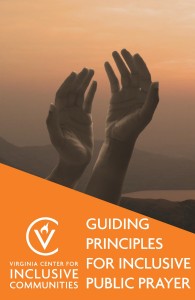Guiding Principles for Inclusive Public Prayer
Guiding Principles for Inclusive Public Prayer – Print Version
Leading others in a group or community prayer places a special responsibility on those who accept such a task.
When functioning in a setting in which it may be reasonably assumed that there is a diversity of identities, one’s actions are significantly different from private behavior. It goes without saying that behavior that may be appropriate in private settings is often unacceptable in public, with the reverse being equally true. This principle is particularly important when a person is asked to take part in or lead others in public religious presentations.
Leading prayer in a public setting is both an opportunity and an honored task. We live in a society made up of many cultures, views, religions, and beliefs. It is a defining part of the greatness of our nation that we have adopted the motto “E Pluribus Unum” meaning “Out of Many, One!”
When we take this pluralistic value to heart, we realize our responsibility to be respectful of and caring for the feelings of our fellow citizens as we engage in any public behavior, while always being true to ourselves.
The Virginia Center for Inclusive Communities has developed the following suggestions for our friends of every faith when called upon to lead others in group prayer or public worship:
- Prayer is an act of worship of the Deity and should never be taken lightly or delivered without thoughtful preparation.
- Public worship and prayer is a time and opportunity to bring people together as one group, and thus should always be the most inclusive in nature.
- The language of such prayers or worship ought to be broad enough to include people of all faiths.
- Such prayers and petitions ought to be generic in nature while taking into account the diversity of the audience that is gathered.
- Those who lead such prayers should make them non-sectarian and respectful of the widely-held belief in God, while avoiding language or images that are connected to any one tradition or practice of a particular faith or religion.
- Worship leaders should be aware that they will often be called on “at the last moment” and thus be prepared with practiced prayers that include all.
- It should be recognized that not all worship leaders feel comfortable engaging in community prayer or public worship using non-sectarian vocabulary and gestures. These friends in our community should be appreciated for their viewpoint. However, those who are uncomfortable with the non-sectarian model should not accept invitations to lead prayer in a public setting with its inherent diversity.
The Virginia Center for Inclusive Communities appreciates the work of The Rev. Dr. Jeffrey B. Spence, our past President & CEO, for creating the original source for this document. Additionally, the following leaders from across Virginia are thanked for their involvement in updating these Guiding Principles:
The Rev. Dr. Grant L. Azdell
Sister Cora Marie Billings, R.S.M.
Imam Vernon M. Fareed
Anne Gibbons
The Rev. Robert G. Moore, III
Rabbi Michael Panitz
The Rev. Dennis S. Roberts

